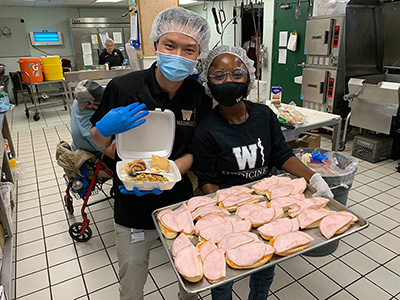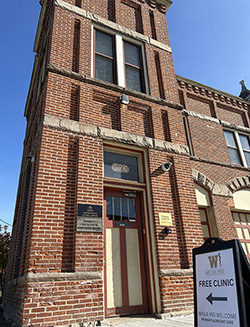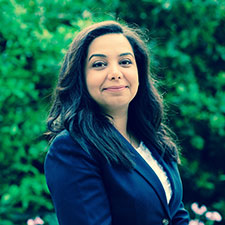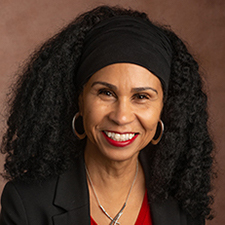
We support initiatives for students, faculty and staff to outreach to the Kalamazoo community through partnerships with organizations and community leaders to champion service to populations with the greatest need and creating opportunities to work collaboratively to enhance the well-being of all members of the community, through an equity framework.
This is done through creation of programs that build bridges, and synergy for making an impact through health promotion, education and volunteerism. The number of organizations increase yearly and we continually seek opportunities to engage community leaders for work together that lends itself to listening, and valuing the community voice for their wants and needs.
Education and Outreach
- Cradle Kalamazoo
As part of the collective impact to create health equity and decrease the infant mortality disparity for black infants, WMed has actively engaged with Cradle Kalamazoo as a strategic partner for research, committees such as reproductive health, FIMR, health equity, safe sleep, and home visiting. Within local hospitals a health equity team is leading the way for systemic change led by Dr. Lisa Graves from WMed and leaders from Beacon Health System and Bronson Healthcare.
- Engagement and Discovery
WMed’s Engagement and Discovery is a 17-month endeavor that begins for WMed students during their first year at the medical school. Students are required to log at least 45 hours of community learning during the 17-month span. Each student will be responsible for keeping track of and logging their own individual hours, and must obtain a minimum of 15 hours per term.
The service learning takes place at an array of sites and initiatives. Some examples include handing out free meals, volunteering at local COVID-19 vaccination clinics, or working with elementary, middle, and high school students as part of the Early Introduction to Health Careers (EIH) pathway program. In other instances, students have helped organize clothing drives for women and children or spent time helping to support the organizations’ after-school and child care programs for children of essential workers, as well as a plethora of other pertinent community initiatives.
This course is focused on efforts to equip students with the core concepts around healthcare systems integration and understanding the best ways to work with the community.
- Firehouse Clinic

The Firehouse Clinic is located at 526 N. Burdick St. inside the city’s former Fire House No. 4. The Firehouse Clinic is a student-run clinic dedicated to serving the unhoused and economically underprivileged population of Kalamazoo.
The clinic, located at 526 N. Burdick St. inside the city’s former Fire House No. 4, opened in August 2024 through a partnership between students in the medical school’s Community Health Interest Group (CHIG) and Kalamazoo Gospel Ministries (KGM).
The clinic is currently staffed by medical student volunteers from 1 to 4 p.m. on the first and third Fridays of each month. The effort is overseen by Cheryl Dickson, MD, MPH, associate dean for Community Education and Engagement, and Mark Schauer, MD, associate professor in the Department of Medicine, who serve as attending physicians in the clinic.
- Health Equity Summit
The 2024 Health Equity Summit aimed to raise awareness, provide education, and encourage conversation around the importance of mental health equity, cultural competency and the well-being for all in the healthcare and medical school communities.
The summit was developed in collaboration with Eric Achtyes, MD, MA, DFAPA, chair of the Department of Psychiatry at WMed, and Roger Apple, PhD, associate professor in the departments of Psychiatry and Pediatric and Adolescent Medicine at WMed, and director of the WMed Pediatric Autism Center.
The event included two phenomenal keynote speakers - Jürgen Unützer, MD, MPH, MA, who serves as professor and chair at the University of Washington; dean of Internal Medicine at USC School of Medicine Greenville, and chief academic officer at Prisma Health-Upstate, and Kevin Fischer, executive director of NAMI Michigan, founder and director of The Dominique Fischer Memorial Foundation, and immediate past-president of Crisis Intervention Team International (CITI).
Past Health Equity Summits
- Health Screenings for the Unhoused

A group of WMed students volunteered during Project Connect at the Kalamazoo County Expo Center in October 2022. This program delivers needed healthcare services to the homeless population. The program partners with two homeless organizations and it will expand to cover homeless that are in the streets by partnering with organizations that deliver basic needs services currently for this population. The homeless population has continued to grow with recent economic downturns and the needs are great. As part of our community engagement and partnership we can make a difference and bring needed healthcare services through our continually expanding services for the homeless.
Students are actively engaged as part of the student interest group Community Health Interest Group and Street Medicine.
- Pathway Programs
EIH 1.5
In 2017, WMed launched EIH 1.5, a health career pathway program for middle school students.
The EIH 1.5 pathway program:
- Improves student self-efficacy and develops intrinsic motivation to create and execute post-secondary education/career goals.
- Improves science and math skills through engaging, hands-on STEM instruction.
- Increases awareness of available health care and STEM careers.
- Increases student leadership capacity through team building, mentoring, goal setting, public speaking and fine tuning soft skills.
The overarching goals of the program are to see the following long-term outcomes:- Increase in college and credential completion rates.
- Increase in the number of underrepresented in medicine (URM) minority students entering health care professions.
- Reduction of community health disparities by having a diverse biomedical workforce.
Please direct any questions regarding the pathway programs to Candace Moore, manager for Health Equity and Pathway Programs, at candace.moore@wmed.edu, or Dr. Cheryl Dickson, EIH Program Director and Associate Dean for Community Education and Engagement at cheryl.dickson@wmed.edu.EIH 2
Since 2014, we have experienced a 127.5% increase in the number of students from Kalamazoo County school districts in our EIH 2 program. The longitudinal initiative is WMed’s flagship program and is comprised of monthly Saturday Science academies held from October to May.
EIH 2 focuses on health sciences, math, and development of critical thinking and problem solving for 10th, 11th, and 12th grade students. The curriculum for the weekend science academies includes intentional, guided research, individual mentoring sessions, clinical and non-clinical speakers.
The EIH 2 pathway program:
- Improves education for youth through educational enrichment and exposure to health careers.
- Decreases current STEM educational gaps for underrepresented students in the community.
- Over time, improves health disparities through education and leadership development that impacts the social determinants of health by affecting change.
- Is vital to the growth of well-trained, diverse health professionals who can serve the increasing health care needs of the population.
The curriculum for the weekend science academies includes:- Presentations from health care professionals
- The study of body systems through Team Based Learning
- Application of clinical skills in our state-of-the-art Simulation Center
- Individual mentoring sessions
- Development of research and presentation skills
At the conclusion of the program, 24 students are chosen to participate in an intensive two-week summer camp that is conducted in partnership with Kalamazoo College. Students accepted into the summer program spend the first week conducting biochemistry research with Kalamazoo College faculty, and explore anatomy and physiology with WMed faculty and staff during the second week.The program is designed to provide health career exposure while teaching science through a health care lens. Students engage in hands-on, team based learning lessons, activities, simulations, mentoring and research facilitated by WMed students and faculty. The program hopes to also enhance students’ self-efficacy for future success in high school and higher education attainment by improving problem-solving and critical-thinking skills.
Eligibility
The EIH 2 pathway program is open to 10th, 11th, and 12th grade students in Kalamazoo County. We accept all applicants and encourage any persons with diverse life experiences to apply. WMed is committed to fostering a learning environment that values, welcomes, celebrates, and appreciates diversity and inclusiveness.
EIH 1.0
The EIH 1 pathway program for 4th and 5th graders is conducted through a partnership with Northeastern Elementary in the Kalamazoo Public Schools district. The objective of EIH 1 is to provide a novel program to facilitate academic success in math and science for students at an early age. The program aims to foster an interest in science and math, as well as improve proficiency in problem solving and critical thinking skills.
The first phase of this program begins in the fall of students’ fourth grade year. A cohort of medical students facilitate lessons and activities once a month. The curriculum, which is aligned with Michigan/Next Generation Science Standards, is designed to expose elementary students to careers in health while providing inquiry-based opportunities for the students to learn science through a health care lens. In the first part of this program, all fourth-grade students learn about the skeletal, muscular, respiratory, and circulatory systems. The students also take a field trip to the medical school, where they have the opportunity to engage with faculty and participate in activities in the state-of-the-art Simulation Center.
The second phase of EIH 1 takes place during students’ fifth-grade year. The students more deeply explore body systems and continue the mentoring relationship with medical students, who work with the same group of 4-5 students throughout their fourth- and fifth-grade year. The fifth grade students also research a health science topic and present a poster of their findings to share with their peers, teachers, and families.
The EIH 1 pathway program:
- Improves success in fostering higher education goals for participants
- Improves skills in science and math acquisition through enhancement of critical-thinking and problem solving abilities
- Exposes participants to health career opportunities
- Promotes team-building skills and positive peer group formation across schools
- Increases awareness of health disparities and prevention
Throughout 4th and 5th grade, the students’ monthly learning topics will include:- What is Health Science?
- The Skeletal System
- The Muscular System
- The Respiratory System
- The Circulatory System
- The Nervous System
- The Immune System
- Nutrition and Exercise
- First Aid
- Dental Health
- Evaluating Evidence
EIH Impact Report 2023-2024 - WMed Community Events
- WMed/Mt. Zion Community Health Conversations
This program is intended to offer health information, including public health and prevention, centered around topics of importance to the community that represent current health status indicators and health disparities. These conversations are convened with input from key community partners for topics that concern the community. The conversations include diverse members of the healthcare team and questions are monitored and addressed throughout the program. Resource information is provided as well as contact information for further questions.
- COVID-19 Vaccine Questions and Answers (January 21, 2021)
- Kidney Disease in the Black Community (February 17, 2022)
- Diabetes and Nutrition (April 21, 2022)
- Breast and Colon Cancer (June 16, 2022)
- Dementia (September 21, 2023)
- Elder Care (November 16, 2023)
- Mental Health (January 18, 2024)
- Heart Health (March 21, 2024)
- ADHD and Behavioral Health (September 19, 2024)
- Mental Health (November 21, 2024)
Community Sponsorships
We are pleased to partner with local non-profit organizations that share our mission and commitment to health equity. Annually, we identify sponsorship opportunities for events in the community that align with our strategic priorities and enable our students, faculty, and staff to attend. Sponsorship opportunities should be directed to cheryl.dickson@wmed.edu.
Our Team

Manager, Pathway Programs

Coordinator, Community Education and Engagement


